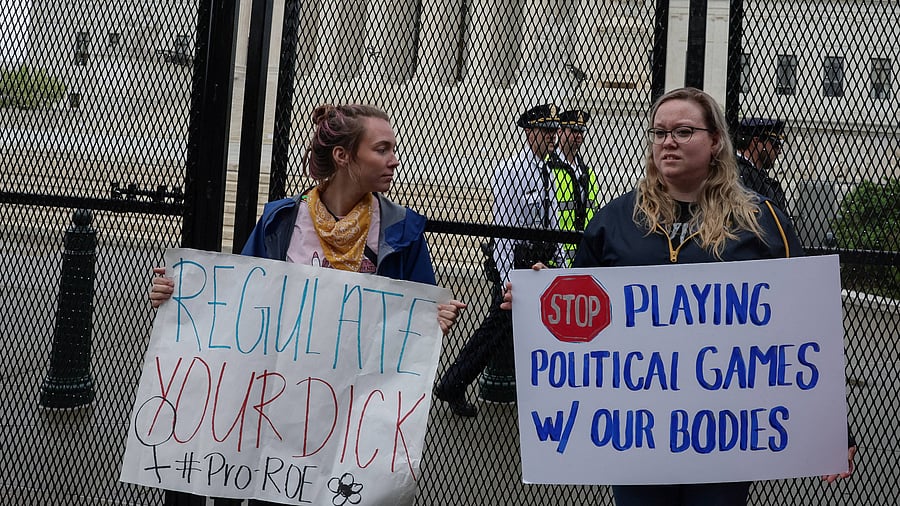
Former US president Donald J Trump installed three Supreme Court justices during his term, thus becoming the first commander-in-chief since Richard M Nixon to install the highest number of US Supreme Court justices. Nixon had nominated six justices, four of whom were confirmed by the Senate. These numbers essentially mean, in common parlance, how the political wind will blow over the next few decades. Currently, they blow the way Republicans want it to because of Trump's nominees. While this is unfortunate in any civil society, the Supreme Courts in democracies remain the last bastion that seems to be falling under the rule of authoritarians or their continued influence. As of 2022, six of the nine US Supreme Court justices are considered conservative in their leanings.
This week, in the US Supreme Court, something rather unprecedented happened. A draft memo of the proposed overturn of a 50-year ruling was leaked to the media company Politico, based out of the Greater Washington DC area. In the reviews that followed, this was labelled an earthquake, though it was expected after the induction of Justice Amy Coney Barrett in October 2019. Her confirmation swung the Supreme Court in favour of the Conservatives, rendering the centrist Chief Justice John Roberts of no consequence.
If this ruling is indeed overturned, it will enable at least 26 Republic-led States (out of the total 50 states in the USA) to make abortion illegal or extremely difficult in their jurisdiction. The rich will still have the option of travelling to the other 24 states to get themselves treated. The poor, most of whom are people of colour, and immigrants, will face the consequences. Other than denying women the right to their own bodies, the overturning of Roe V Wade will be a scathing deterrent for the most marginalised among us. At its root, the overturn is an attack on the freedom and privacy women in the US have enjoyed for over 50 years. It will signal the return of the barbarous age that everyone assumed we had left behind. The resurgence of nationalism in other countries has also shown that those voting for an abortion ban are on the rise. Countries like Turkey, and the United Kingdom, where data is available on Statista, show a negative swing in pro-banning abortion choice.
A few things over the past years have led to this apparent leak. In 2016, when a Supreme Court position became available due to the death of Justice Antonin Scalia, President Barack Obama nominated Merrick Garland to succeed him. However, the nomination was blocked by the Republican leader of the house, Mitch McConnel, who opposed it by saying it was null and void because of President Obama's final year in office. This was the first position that the incoming President, Donald Trump, filled by nominating Justice Neil Gorsuch.
Ironically, Trump nominated Amy Coney Barrett to succeed the legendary Ruth Bader Ginsberg (RBG) during his last months in office. No opposition was marked for her nomination. Earlier, in 2013 and 2014, President Obama had apparently tried to persuade RBG to retire, so he could nominate a liberal-leaning justice to succeed her. She disagreed, and the rest is part of why we face the distinct possibility of Roe V Wade being overturned by a conservative-leaning Supreme Court.
The US has seen a series of massive protests, particularly during Donald Trump's presidency – firstly, the women's march outshining his swearing-in and then after George Floyd's murder by a white policeman. The Black Lives Matter protests ran throughout the country, urging people to speak up and make changes in their organisations, big and small. Those changes, brought about by the voices that spoke up, have begun to show – in schools and colleges and in the hundreds of diversity-related positions that have become available within the past eighteen months in companies across the US states. As these positions and culture become a norm, it remains to be seen how many companies walk the talk in the years to come.
The women in the US will not be silenced. This is a country where the protests against the war in Vietnam are still remembered fondly. It was only recently that the first Black-Asian woman, Kamala Harris, became the Vice President and the first Black woman, Ketanji Brown Jackson, was confirmed by the Senate for the Supreme Court. It is not a country where voices can easily be silenced. The draft overturn of Roe V Wade only exemplifies the existing political divide, where a losing presidential candidate also receives 74 million votes, more than any presidential candidate in its history, other than Joe Biden, who received 81 million of the votes.
Companies like Tesla, Amazon, Uber, Airbnb and several others have reacted favourably, saying they will provide a security net to their employees, going up to reimbursing $4000 for travel to other states. Tesla, which had recently moved to Texas, announced a policy favouring its female employees as soon as the ban became effective in the state last year.
This is also a well-timed leak – I do not surmise the conservative bench would be amenable to leaking such information. If anything, the ensuing protests will reduce the chances of the Republicans winning the upcoming midterm elections. The last time the Supreme Court of the US gained notoriety was in 2000 when it ruled in favour of an incoming President, George W. Bush. Time will tell if this facet of the American democracy has finally fallen to a political gimmick or will it come out stronger from this fiasco. The taking away of the already limited choices for women in any society cannot be allowed to be seen through a political lens.
(The author is a former Chief of Communications with the United Nations in New York, where he worked for more than a decade.)
Disclaimer: The views expressed above are the author’s own. They do not necessarily reflect the views of DH.